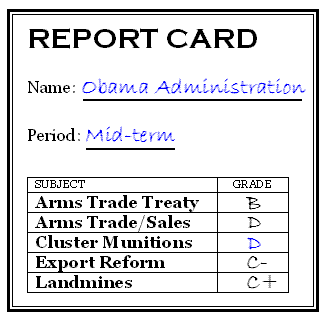By Jeff Abramson
The Obama administration started off well when  on Jan. 21, 2009 it deposited ratifications to three protocols and an amendment to the Convention on Certain Conventional Weapons (CCW), a meaningful accord that seeks to regulate the use of weapons judged to be more inhuman or indiscriminate than others. Hopes that this administration would then take a new approach on cluster munitions, one of the most high-profile indiscriminate weapons, have thus far been dashed.
on Jan. 21, 2009 it deposited ratifications to three protocols and an amendment to the Convention on Certain Conventional Weapons (CCW), a meaningful accord that seeks to regulate the use of weapons judged to be more inhuman or indiscriminate than others. Hopes that this administration would then take a new approach on cluster munitions, one of the most high-profile indiscriminate weapons, have thus far been dashed.
Indiscriminate Weapons, Especially Cluster Munitions: D
When agreeing to the CCW protocol on incendiary weapons, the United States attached an understanding that would allow for using the arms against military targets located in concentrations of civilians in ways that were rejected by more than a dozen European countries. While the Obama administration in essence inherited that controversial approach, it has been defending it.
Washington has also continued to lobby for an agreement within the CCW on cluster munitions that does not meet the new global standard, which is the Convention on Cluster Munitions (CCM). More than two-thirds of NATO member states have signed or ratified the CCM, but the United States has continued to authorize trade in weapons that do not meet the new accord's guidelines (see Saudi arms deal).
Also problematic are allegations that the United States used cluster munitions in Yemen in 2009. When pressed, the administration continues to refer questions to the Yemeni government. The Wikileaks scandal in November drew into question whether Yemeni officials were covering up U.S. actions, a topic that resurfaces as we watch to see what will unfold with the government there.
Until the United States comes clean on what happened in 2009 and moves to align itself with the Convention on Cluster Munitions, Washington will continue to be out of step on using indiscriminate weapons that are increasingly rejected by the global community.
------
This concludes a week of grading the Obama administration conventional arms control record. ATT, arms trade/sales, export control reform, and landmines covered earlier.
Grading Guide
A: Global leader pressing for actions to curb arms races and set or reinforce highest international norms.
B: Working to raise or meet global norms. Breaking with past policies where appropriate.
C: Policies under review and may result in moving to meeting global norms, or may result in undermining them.
D: Falling behind global norms. Actions may exacerbate arms races, illicit proliferation or other threats to national and international peace and human security.
F: Actions undermining global norms and likely contributing to arms races or insecurity.
